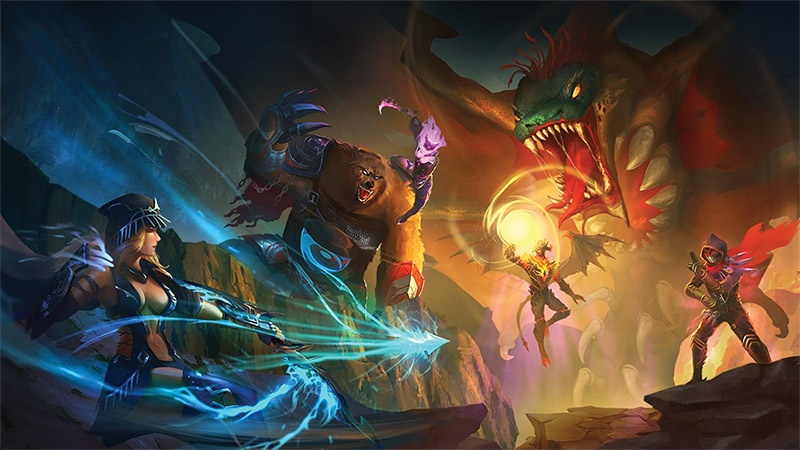The blockchain newcomers playing towards the next level
 |
| Games like Fight of the Ages are the backdrop for bilions of US dollars in sales of NFTs |
After Etheria (2015) and CryptoKitties (2017) introduced blockchain-based ownership of in-game assets, the world soon got hooked on games circling around NFT and decentralised ownership records backed by different blockchain technologies.
A report by L’Atelier BNP Paribas and NonFungible.com showed that NFT sales in all markets hit a stunning $17.6 billion in 2021, more than 200 times the volume in 2020 ($82 million). For context, the volume of global recorded music revenues hit a similar figure ($20 billion) in 2019. Meanwhile, sales from NFT games alone hit around $5.2 billion last year.
While the video game industry has been developing for several decades now, one might wonder what all the fuzz is about with NFT games. For gamers, one key difference could be the attractiveness of actually owning in-game assets.
Lori-Lee Elliott, YouTuber and founder of tech company Future Sight AR last August said, “If we look at a traditional game – first, you buy the game and while playing you collect gear, weapons, skins, cards, and other items. They reside in an inventory in the game. If you stop playing the game altogether, all the time, effort, and money that you put in to get those game assets are lost.”
Elliott refers to a vital element of all traditional video game assets – they all merely exist within the game and are owned by the game’s publisher.
“In an NFT game, the key difference is that you immutably own those items, of which there is a limited quantity. The item itself also exists outside the game [in one’s NFT wallet].”
This is possible because of the blockchain technology that backs up critical data, such as the quantity and ownership of an in-game asset. Since the blockchain is essentially a decentralised ledger that stores information such as transactions and values, it is uneditable and thus considered more secure than any centralised solution that could be stored at the servers of just one company or bank.
“For example, if we have a battleaxe as an NFT, the ownership of that battleaxe is tracked on the blockchain. If Carl owns that axe, he will always own it, until it is sold or traded. The game could literally shut down, and Carl would still own his axe in his NFT walled,” Elliot explained.
Breaking records
Last month, the Vietnamese NFT game Axie Infinity became the first NFT series to hit $4 billion in total sales, as regional media reported, citing data from CryptoSlam.
This also places Axie Infinity at the top position of all times at the data aggregator CryptoSlam in terms of NFT collection sales. As of last week, the game had accumulated trades worth twice as much as the direct follow-up, the pixel-art collection CryptoPunks with over $2.1 billion in sales. As of last week, over 2.6 million users owned assets of Axie Infinity.
And indeed, Axie’s sales reached a serious mass. On just one day last week, total sales hit over $760,000 for in-game assets. The top individual buyers and sellers during the previous weekend hit well over $33,000 and $23,000, respectively.
However, the market is highly volatile. While the sales of the cute-looking Axies – axolotl-inspired digital pets that make up the main in-game assets – hit their peak on November 4 with a volume of over $40.8 million, last month’s total sales could only reach around $31.8 million, the lowest in the last 10 months.
Axie Infinity is an NFT-based online game, which was developed by the Vietnamese studio Sky Mavis. The company became Vietnam’s third unicorn at the end of last year, after bagging $152 million in its Series B funding round led by Andreessen Horowitz from a16z.
Eddie Thai, partner of 500 Startups Vietnam, a fund that invested in Axie in both seed and series A wrote, “In our first investment memo for Sky Mavis I wrote that there’s a long way to go before blockchain games can gain access to the vast majority of gamers. Indeed, Axie Infinity had just 600 monthly active users at the time. It would be easy to think it might take a decade to get there, if at all.”
Nonetheless, Sky Mavis and Axie Infinity made it to become one of Vietnam’s most popular video game exports, with most players coming from the Philippines where reports appeared of families earning their entire income with the game.
Axie Infinity’s economy is built on the Ronin Network, an Ethereum-linked sidechain developed by Sky Mavis. But in March, hackers compromised the Ronin Network, cashing in around $620 million.
Theo Tsihitas, technical writer at comparitech explained, “This was made up of 173,600 in ETH (worth just less than $595 million) and $25.5 million, making it the biggest crypto heist to date. Ronin Network, which supports Axie, said its Ronin and Axie DAO validator nodes had been compromised with the funds being drained in two transactions.”
While the aftermath of this hack remains uncertain just a few weeks in, Axie Infinity is facing more and more competition from its homeland of Vietnam.
Ambitious newcomer
Fight Of The Ages (FOTA) is set to become the next NFT project that could revolutionise the industry. The ambitions of FOTA do not stop at achieving what Axie has already done, but to lead the market and become a role model for upcoming play-to-earn games.
FOTA is a triple A multiplayer online battle arena game with roleplay-game elements. To do so, FOTA integrates Microsoft’s mixed-reality (MR) technology, Microsoft Mesh and offers interactions between players despite far distances.
What’s more, FOTA allows players to interact and custom their characters with Mesh. The freedom of choice in character selection and items enhances the experience of progressing throughout the FOTA Metaverse. One’s journey can start from one of the three planets, and you will be exposed to a wide variety of environments and creatures.
FOTA’s players can also team up with their friends for battles and exploration, the teamwork experience makes players better connected to FOTA and thus the game’s developers hope that their creation becomes worth engaging for years.
FOTA’s development progress aims at allowing players to participate in the game through multiple platforms and devices, as well as directly through MR devices. Therefore, platforms and gameplay diversification are among the top factors that could take FOTA to the next level of blockchain-based projects.
According to Jennie Hoang Phuong, MarCom advisor of FOTA, the project will host its token generation event on May 19. “Based on the estimated supply and selling price of the token on the launch date, FOTA will be worth around $119 million,” Jennie said.
This whopping valuation for an unpublished game showcases FOTA’s ability to gain the trust and support from investors, venture capitals, and traditional gamers from all over the world, mostly based on the developers’ focus on sustainability, state-of-the-art technology, and reliable human resources.
In the first quarter of 2022, FOTA has raised a total of $8.3 million in seed and private funding rounds.
| William Do - CEO, HOBBIT Venture Capital
The Vietnamese blockchain game market is still in its infancy and there are still various policy barriers, thus one of the first barriers to overcome is the full legalisation of digital currency projects here. As long as this remains undone, consulting and operations remain difficult. Because of this, there is a second challenge – accessing traditional investment funds. Traditional funds usually choose projects that are guaranteed and recognised by the state to minimise the possibility of risk and failure, even though they are venture capital funds. Besides this, there are many choices in crypto investments and little experience or criteria to evaluate a project. Another issue regards the lack of knowledge about cryptocurrencies and NFTs in society. However, the Vietnamese market is quite advanced when it comes to knowledge about the blockchain, despite not being widely disseminated. Existing blockchain associations, albeit rare and currently unconnected, could help in the rapid blockchain development. Trinh Ngoc Duc - CEO, FOTA
Vietnam is one of the countries with a fairly large and diverse gamer population. However, the skills of local gamers have not yet been fully exploited. Apart from offering a breath of fresh air and a new world of experiences, we also aim to implement an integrated metaverse and the ability to experience more variety than in traditional games. FOTA is extremely confident about its product, as the team has developed everything with optimal technologies, such as Microsoft’s MR solution Mesh. But the direction between D.Lion and FOTA is completely different. D.Lion lets us choose our own path, in which every aspect of FOTA’s operations is backed by its team that ensures a stable development. FOTA is proud to be a Vietnamese product, and the news about our plans has attracted hundreds of human resources from home and abroad. All of them have long-term experience in their own expertise. Every one of our outstanding individuals is devoting their full talent, sometimes more than what we could expect. |
What the stars mean:
★ Poor ★ ★ Promising ★★★ Good ★★★★ Very good ★★★★★ Exceptional
Related Contents
Latest News
More News
- Masan Consumer names new deputy CEO to drive foods and beverages growth (February 23, 2026 | 20:52)
- Myriad risks ahead, but ones Vietnam can confront (February 20, 2026 | 15:02)
- Vietnam making the leap into AI and semiconductors (February 20, 2026 | 09:37)
- Funding must be activated for semiconductor success (February 20, 2026 | 09:20)
- Resilience as new benchmark for smarter infrastructure (February 19, 2026 | 20:35)
- A golden time to shine within ASEAN (February 19, 2026 | 20:22)
- Vietnam’s pivotal year for advancing sustainability (February 19, 2026 | 08:44)
- Strengthening the core role of industry and trade (February 19, 2026 | 08:35)
- Future orientations for healthcare improvements (February 19, 2026 | 08:29)
- Infrastructure orientations suitable for a new chapter (February 19, 2026 | 08:15)



 Tag:
Tag:



















 Mobile Version
Mobile Version